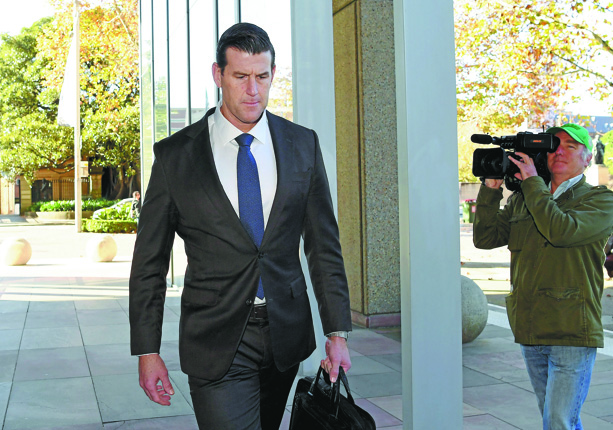silubaba news:

A dark cloud
However, the defamation trial, while damning Roberts-Smith, casts a dark cloud over the Australian military where accusation of war crimes has been rife for several years.
In 2011, the ABC reported how "capture or kill" operations allegedly involved the murder of civilians. In 2017, there were more reports of Australian soldiers allegedly killing innocent civilians. And all the time the finger was being pointed at the elite SAS regiment.
In the following years, Major General Paul Brereton, a judge of the New South Wales Supreme Court and Army Reserve Officer, headed a four-year inquiry.
Known as the Brereton Report, it found "credible evidence" that elite soldiers unlawfully killed 39 civilians and prisoners in Afghanistan.
Australia's military involvement in Afghanistan began in September 2001 and continued until mid-June 2021, making it the longest engagement by Australia in an armed conflict.
The report kept most details a secret but said the allegations included what was "possibly the most disgraceful episode in Australia's military history" — a redacted event that occurred in 2012.
The inquiry found a "warrior culture" within Australia's special forces and recommended that 19 current or former soldiers be investigated over alleged killings of prisoners and civilians from 2009-13.
So far, only one former SAS soldier, Oliver Schulz, has been charged with the war crime of murder.
The report labeled the actions of several Australian SAS members "disgraceful and a profound betrayal of the Australian Defence Force's professional standards and expectations".
However, the full report has been heavily redacted, especially those details about alleged incidents involving civilian Afghans.
What is known is that none of the alleged killings took place during combat, and none of them were combatants.
The circumstances of each, were they to be eventually accepted by a jury, would constitute the war crime of murder, Brereton said.
In all cases, the report found it "was or should have been plain that the person killed was a noncombatant". The chief of the Defence Force, Angus Campbell, said that in each case, the intent cannot be in dispute.
"None were alleged to have occurred in circumstances in which the intent of the perpetrator was unclear, confused or mistaken," he said. "And every person spoken to by the inquiry thoroughly understood the law of armed conflict and the rules of engagement under which they operated."
One alleged incident, heavily redacted in the report, was described as "possibly the most disgraceful episode in Australia's military history".
The report revealed allegations of the "blooding", or initiation, of young special forces soldiers.
The report described a process in which young special forces soldiers were allegedly instructed by their patrol commander to execute a detainee.
Weapons or radios, known as "throwdowns", were allegedly placed on the body, and a cover story allegedly created to mask the crime and deflect any scrutiny.
The report found a culture of secrecy and cover-up pervaded the special forces. Patrols would "compartmentalize" from their leaders and from one another, hiding their actions on the battlefield from all.
Operational reports were allegedly sanitized to make it appear as if special forces were complying with the laws of engagement.
"Operation summaries and other reports frequently did not truly and accurately report the facts of engagements, even where they were innocent and lawful, but were routinely embellished, often using 'boilerplate' language, in order proactively to demonstrate apparent compliance with rules of engagement, and to minimize the risk of attracting the interest of higher headquarters," the report said.
At the same time, special forces saw themselves as above reproach. The report said they allegedly had a sense that they were elite, entitled and beyond the scrutiny of those outside the fence. The normal rules did not apply to them, it said.
The report found younger soldiers viewed their patrol commanders as "demigods". Disobeying their instructions, it was feared, would end their careers.
Complaints ignored
Complaints about Australia's conduct from Afghan nationals and local human rights groups were largely ignored, the report said. The complaints were treated as Taliban propaganda or attempts to secure compensation.
In March, Mark Weinberg, former Commonwealth director of public prosecutions and a judge in the Federal Court and Victorian Court of Appeal, said in Melbourne that it is only recently that Australia has given "serious attention to the issue of war crimes allegedly committed by our forces".
"So far as I am aware, few, if any, Australian servicemen have ever been convicted by an Australian court, or military tribunal of any kind, of an offense that could conceivably be characterized as a serious war crime."
In the wake of the report, the Australian government set up the Office of the Special Investigator, which is currently investigating alleged war crimes committed by Australian troops while in Afghanistan.
Donald Campbell, an international law expert at the Australian National University, said none of the evidence presented in the defamation case can be used in any criminal trial, and investigations would have to start afresh.
"The government has supported the special investigator because they know that if they are going to bring any successful criminal prosecutions, they need to go out and collect evidence in Afghanistan," he said in an interview with the BBC on June 2.
Responsibility for what went wrong must be shared widely, said James Connor, a military sociologist at the University of New South Wales, in the same BBC interview.
"That's not to diminish their actions … but the culture is rotten and the cover-up which has flowed from that is also rotten."
silubaba.us news onlne
微信扫描下方的二维码阅读本文


